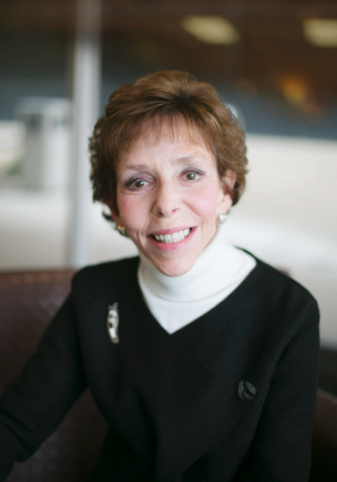
AADL Talks To: Janis Bobrin

Janis Bobrin came to the University of Michigan in 1969 to study urban planning and quickly became politically active in environmental issues with a particular interest in water resource management. She eventually served six terms as Washtenaw County Drain Commissioner. Since retiring as Drain Commissioner in 2012, Janis has served on numerous regional boards including the Huron River Watershed Council, the Michigan League of Conservation Voters, and Dawn Farm. Janis talks with us about some of the projects she undertook as Drain Commissioner and the many challenges she and her staff faced over the years. She also talks with us about Ann Arbor's ongoing efforts to address the Pall-Gelman dioxane spill and issues surrounding urban planning and density.
Read more about Janis Bobrin in historical articles from the Ann Arbor News and Ann Arbor Observer.
JCC Conversations | Fred Upton, Debbie Dingell and Ryan Clancy
Ryan Clark of No Labels, and Representatives Debbie Dingell (D-12th CD) and Fred Upton (R-4th CD) of the Problem Solvers’ Caucus discuss prospects for bipartisan legislation in Congress. Learn how goodwill still exists and how it can be effective with the support of No Labels, even in today’s polarized political climate.
JCC Conversations | Yalcin Yanıkoğlu and Bob Chunn
Yalcin Yanıkoğlu and Bob Chunn have been intimately involved in helping create and evaluate proposed maps with their proprietary software. Chuck asked them to evaluate the Independent Redistricting Commissions maps so citizens can knowledgeably comment on them while there is still time.
AADL Productions Podcast: Lola Jones and Carol Gibson
Lola Jones and Carol Gibson are well-known to anyone familiar with Ann Arbor history. Over the past 30 years they have sought out and documented the history of the African American experience in Ann Arbor through a series of projects under the moniker Another Ann Arbor; it is largely through their work that the Ann Arbor African American story is a part of our shared community identity. Lola and Carol stopped by the library to talk with us one day about the work they have done over the years and where they are headed next. They shared with us some of the interesting people and events they have learned about and brought to the community in their television program, their documentaries, and their book. You can now watch one of their documentaries online at aadl.org in our video collection. A Woman's Town was produced in 1991 and tells the story of Ann Arbor through the voices of prominent African American women.
Author Event | William D. Lopez: Separated: Family and Community in the Aftermath of an Immigration Raid
In Separated: Family and Community in the Aftermath of an Immigration Raid, local author William D. Lopez examines the lasting damage done by this daylong act of collaborative immigration enforcement in Washtenaw County, Michigan.
Exploring the chaos of enforcement through the lens of community health, Lopez discusses deportation's rippling negative effects on families, communities, and individuals. Focusing on those left behind, Lopez reveals their efforts to cope with trauma, avoid homelessness, handle worsening health, and keep their families together as they attempt to deal with a deportation machine that is militarized, traumatic and implicitly racist.
This event was part of the 2020 Washtenaw Reads. For more information about Washtenaw Reads and previous years' reads, visit wread.org.
Sustainable Ann Arbor Forum | Race and Class Equity in Washtenaw County
Ann Arbor is the eighth most socioeconomically segregated metro area in the U.S.; the second most segregated city in the nation in service class segregation; and the fifth in working class segregation. In 2010, Census data shows white residents accounted for 73% of Ann Arbor's population, just under Michigan's average of 79%, while African American residents accounted for just 8% of residents—nearly half of the state average of 14%. Ypsilanti, on the other hand, is made up of 62% white residents and 29% African American residents: a dramatic imbalance for two closely tied cities. Housing is a social determinant of health so where you live matters. Join local experts as we delve into the issues and opportunities surrounding race and class equity throughout Ann Arbor and Washtenaw County.
Panelists include:
- Dr. Tony Reames (Assistant Professor, School for Environment and Sustainability, University of Michigan),
Who Holds the Power: Policing in Ann Arbor
Who holds the power in Ann Arbor when it comes to law enforcement? What does that mean for those who are not in power? How has this all changed over time? A panel of local experts discuss the role of police around the city and on the University of Michigan campus.
This was the second of a series series of discussions addressing the question: Who holds the power in Ann Arbor? The series, a partnership with the Michigan Daily, was made possible by the Poynter College Media Project.
Farms and Open Space: Preserving Rural Washtenaw County
A panel of experts from Washtenaw County government agencies and nonprofits discuss what we can do to preserve farmland, forests, open space, and natural areas in Washtenaw County. They will highlight what efforts are already under way, and how we can expand efforts to help local farmers and conservationists.
This panel includes members from the Mindful Eating Team of the Ann Arbor Unitarian Universalist Congregation, the Park Planning and Natural Areas Planning Department of Washtenaw County, members of the Legacy Land Conservancy, local farmers, and Argus Farm Stop.
This event is in partnership with the Unitarian Universalist Church of Ann Arbor.
Sustainable Ann Arbor Forum | Adapting to a Changing Climate
The City of Ann Arbor is already experiencing impacts from climate change. More severe storms, increased precipitation, rising temperatures and extended heat waves all pose challenges to how we live, work, and play in our community. Join a conversation on how the Ann Arbor community is taking steps to address climate impacts and what more we could be doing at the city, neighborhood and individual level. Climate adaptation experts will share the soup to nuts on climate change for Ann Arbor and what we can do to thrive in a changing future.
Beth Gibbons - Beth Gibbons is the Executive Director of the American Society of Adaptation Professionals (ASAP). In this role, she is responsible for strengthening ASAP as an emerging nonprofit organization, managing relationships with its members, board and donors, and bringing adaptation best practices into the broader conversation. Previously, Beth was Director of the University of Michigan Climate Center and managed NOAA’s Great Lakes Regional Integrated Sciences and Assessments Center. She also worked for the Graham Environmental Sustainability Institute as a research specialist, helping develop and implement the Great Lakes Adaptation Assessment for Cities. Previously, Beth worked for the International Forestry and Research Institute and the General Federation of Women’s Clubs supporting organization operations and communications. She served in the Peace Corps in Agodopke, Togo. Beth earned her undergraduate degree in Comparative Politics from the Catholic University of America and holds a Master of Urban Planning and a Masters Certificate in African Studies from the University of Michigan. Beth is based in Ypsilanti, Michigan.
Jennifer Lawson, Water Quality Manager, City of Ann Arbor - Jennifer Lawson started her career as a Civil Engineer’s daughter and at the age of 7, started working at her Dad’s office, running bluelines, holding a survey rod and coloring mylars. Jen is currently the Water Quality Manager for the City of Ann Arbor. She has a Bachelor of Science in Resource Development from MSU and a Master’s degree in Landscape Architecture from U of M focusing on Landscape as Infrastructure (How the ecology of the landscape can provide a service). With 18 years of experience in both private consulting and municipal engineering, she has a unique balance and understanding of water infrastructure regulations and management needs.
Speak Truth To Power
Join the Michigan Daily for the first in a series of panel discussions. In part one, "Speak Truth To Power: The Role of Journalism," panelists examine concerns of transparency and accountability in local institutions, with a particular focus on the role played by journalists and local news organizations.
A panel of esteemed, professional local journalists discuss these topics:
David Jesse, the higher education reporter for the Detroit Free Press, has covered the state’s two-year and four-year colleges and universities for a decade. His work has focused on higher education finances, access and accessibility and sexual assault on campus. In the past year , he has broken major stories on the cover-up at Michigan State University following the Larry Nassar scandal. He, along with a reporting partner, have spent more than two years penetrating the secrecy around the University of Michigan’s $12 billion endowment. He has won dozens of national and state awards for his work. Prior to joining the Free Press, he worked for papers around the state of Michigan, including the Ann Arbor News.